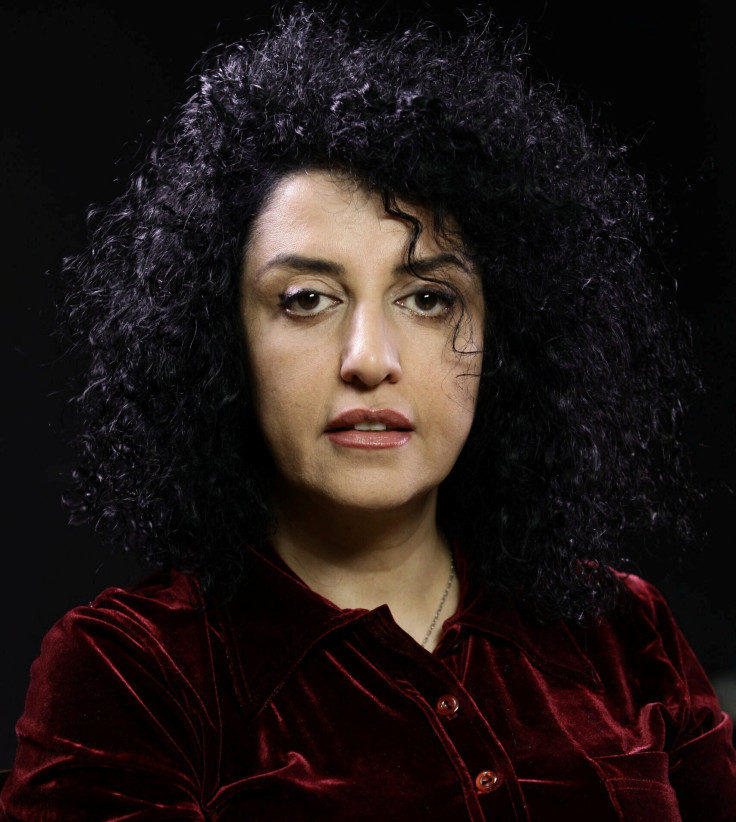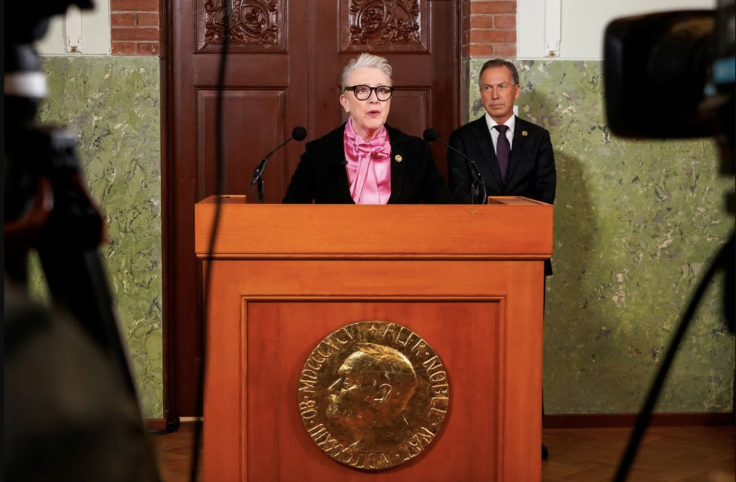Iranian Activist Narges Mohammadi is Awarded the 2023 Nobel Peace Prize
Narges Mohammadi has bravely campaigned in Iran since the late 90s against the regime's brutal violations of human rights. She is still imprisoned.

This year's Nobel Peace Prize has been awarded to jailed Iranian activist and journalist, Narges Mohammadi, "for her fight against the oppression of women in Iran and her fight to promote human rights and freedom for all".
Berit Reiss-Andersen, the chair of the Norwegian Nobel Committee opened her dedication to Mohammadi by citing the Iranian protests' Farsi rallying cry of "Zan Zendagi Azadi" or "Woman, Life, Freedom".
Mohammadi, 51, who has a Physics and engineering background, has been an activist since her university days. She has campaigned in Iran against the death penalty, for women's rights and for the improvement of conditions inside Iran's prisons.
Mohammadi has been incarcerated for the last 13 years. She has been arrested several times, starting in 1998, and is currently serving multiple concurrent sentences. Over the course of her life, she has been arrested 13 times and sentenced to 31 years in prison as well as 154 lashes.
In 2003 she joined the Defenders of Human Rights Center (DHRC) in Tehran, an organisation founded by the 2003 Nobel Peace Prize laureate Shirin Ebadi. In 2011, Mohammadi was arrested again and sentenced to many years of imprisonment for her membership in the DHRC and her efforts to assist incarcerated activists and their families.
In 2014, she spoke at the gravesite of blogger Sattar Beheshti, who died in police custody under suspicious circumstances. As a result, she was summoned to Evin Prison Court. She stated at the time that the summons did not detail the charges against her.
In May 2015, she was arrested again for speaking out against the death penalty.
In 2019, whilst in prison, she went on a hunger strike together with British-Iranian detainee, Nazanin Zaghari-Ratcliffe.

Whilst she was in prison, new charges were brought against her relating to a sit-in staged by prisoners. She was released in 2020. Upon her release, she wrote the foreword for the Iran Human Rights Annual Report on the Death Penalty.
In 2021, she was found guilty of "spreading propaganda against the system" and incarcerated again.
In a 2022 report published by the BBC during the protests following Mahsa Amini's death, Mohammadi detailed, from prison, allegations of horrific abuse of female prisoners including sexual abuse, torture and solitary confinement.
Mohammadi has bravely continued her campaigning and participation in the protest movement from behind bars. In recordings recently obtained by CNN, she is heard leading chants of "Zan, Zindagi, Azadi" in prison.
Although the award is unlikely to lead to Mohammadi's release, it is hoped that it will act as a boost to the protest movement inside Iran, which has been largely quelled following a brutal crackdown by authorities. Patrols by the notorious morality police resumed in July.
The United Nations this month labelled new draft laws tightening punishments for women breaking hijab rules as "gender apartheid".
Previous Nobel laureate and Mohammadi's former boss at the DHRC said: "I congratulate Narges Mohammadi and all Iranian women for this prize."
"This prize will shed light on violation of women's rights in the Islamic Republic ... which unfortunately has proven that it cannot be reformed," Ebadi told Reuters from London.
"Tremendous Personal Cost"
Mohammadi's brother, Hamid Reza, spoke to Norwegian broadcaster NRK of his delight and hopes on waking up to the news: "The joy is so great. I am so happy on behalf of Narges...We hope it will be safer for those in Iran. The situation there is very dangerous, activists there can lose their lives."
Reiss-Andersen of the Nobel Committee remarked in her citation that "(Mohammadi's) struggle has come at tremendous personal cost".
Mohammadi's husband, Taghi Rahmani, and teenage twin children, Ali and Kiana, now live in exile in Paris. She has not seen them since they were eight. Rahmani is also a journalist who was imprisoned in Iran in the past. They met attending underground history classes during university.
Writing to CNN from behind bars, Mohammadi said: "The moment I said goodbye to Ali and Kiana was not unlike the time I almost died in the tree-lined yard of Evin." She did not specify details of the latter event to which she has referred.
Speaking rather poetically about the heartbreak of bidding farewell to her family before they left for Paris, she lamented: "I picked the dandelions of Evin's yard. I stood barefoot on the hot asphalt on July 14. My feet were burning but my heart was on fire. I sent the dandelions to the sky and my children's hands, feet and faces passed my eyes and tears fell like spring rain."
"I have chosen to not see my children or even hear their voices and be the voice of oppressed people, women and children, of my land," she says.
The prize comes as other high-profile journalists, including those associated with the Zan, Zindagi, an Azadi movement, also languish in prison. They include journalists Niloofer Hamedi and Elahe Mohammadi, who broke the story of Mahsa Amini's death – and both of whom the Revolutionary regime holds responsible for sparking the resultant women's rights protests - the most significant challenge to the regime's authority since its inception in 1979.
Hamedi covered Amini's death in hospital whereas Elahe Mohammadi covered the 22-year-old's funeral.
According to the 2022 prison census released by the Committee to Protect Journalists (CPJ), Iran ranked as the world's most prolific, and hence worst, jailer of journalists as of 1 December of that year.
Overall, 95 journalists are known to have been detained by Iranian authorities since the outbreak of protests following Mahsa Amini's death.
© Copyright IBTimes 2025. All rights reserved.






















